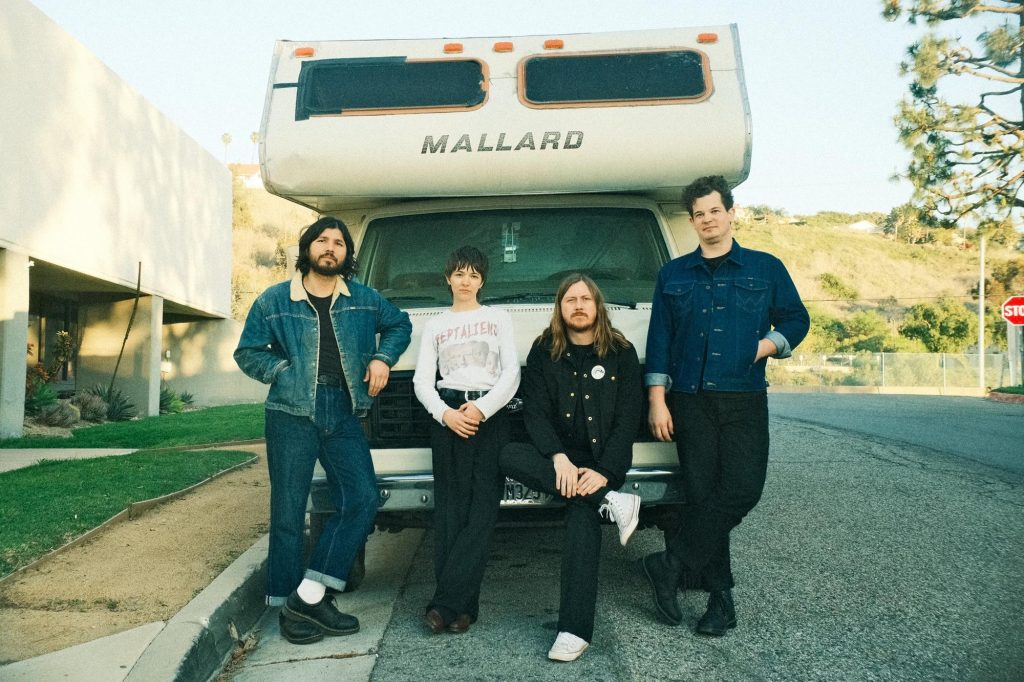
From practicing in their family shed as teenagers in rural Australia, to touring the world with Fleetwood Mac, Black Rebel Motorcycle Club, King Tuff, and King Gizzard, it’s been a strange trip for the four Findlay sisters. As Stonefield, they’ve got three albums and thousands of miles under their belts, plus plenty of perspective on what it’s like to fight to make a place for themselves, and tell their own story.
Written largely on the road in America earlier this year, the songs on BENT are filled with reference and reflection–the kind that comes from months spent far from home, living on four wheels. The surreal isolation of trudging through white-out snow and snaking down deserted highways served as the perfect backdrop for the band to look inward, taking stock of the journey they’ve taken thus far as musicians, and as people. “It’s a culmination of experiences, emotions, and stories collected over time,” explains lead singer and drummer Amy Findlay, “A growth of honest, raw, energy that has been burning within us and waiting for its moment.”
Recorded in just five days with Joe Walker and Stu Mackenzie from King Gizzard at their studio in Melbourne, the album is almost 100% live. Besides being an impressive feat and the flexing of a confident band operating at the height of their powers, that immediacy lends the album a distinct, crackling energy–thunder, lightning, and muscle-bound horsepower. “Sleep” opens the album with guitars covered in five inches of sludge and distortion and something that sounds like a far-off siren, or the high-pitched howling of the wind. It serves as a warning, a call to arms, kicking things off with a next-level version of the massive, unholy racket the band has become known for over the course of their last three albums.
The sonic inspiration taken from listening to Black Sabbath, Beak, Deep Purple, The Alan Parsons Project, and Mike Oldfield inject BENT with its sternum-shaking heaviness and ever-present swagger, but also its exploratory fearlessness–letting the songs loose to twist and turn, sticking to no one’s rules but their own. Take the proggy, keyboard-soaked intro at the top of “People,” or the cheeky combination of tinnitus-inducing hard rock and hip-shaking boogie at the core of “Dead Alive.” “Don’t make me think I’ve lost control / I know exactly what you said / Don’t make me think it’s in my head,” Amy sings during the latter, keeping the lyrics as defiant as the music.
“The album is about our own experiences and stories,” explains Amy, “Songs about the fear of walking home alone at night, stories of what it’s like being an all-female band and the power of supporting one another.” With that being the lyrical subject, the music that came out is definitely our heaviest.” It’s clear that darker thoughts were on the Findlay sisters’ mind– “Route 29,” with its suspenseful synth intro was inspired by the creepy The Route 29 Stalker podcast the band was listening to as they drove the namesake road on their way to a gig with King Tuff, and the cascading synth line and slinky restraint of the hi-hat on “If I Die” can only distract so much from the song’s terror-stricken lyrics.
It’s on the album’s last two songs that the band makes their strongest statement, using “Shutdown” to explore the doubt and search for validation that comes from moving and working within an industry that often makes the band feel like outsiders, lacing lines like “Is it easy for you living / When you don’t have to prove your meaning” in between a battle-cry chorus and detonations of guitar and keyboard. And “Woman” takes it to the edge with a chorus of “I am enough / I am woman,” spelling it out for anyone that hasn’t been paying attention.
BENT has all the chills and spills you would expect from an album that mines inspiration from some of the darker experiences of being misrepresented, belittled, and underestimated. By taking control of the narrative, and pumping it up with stack-blowing, guitar hero riffs and razor-edged vocals, it becomes an album of power, control, and confidence–projected in the face of a world that too often forces the opposite.

Hooveriii
West-coast fever dream denizens Hooveriii have been cracking the cosmic egg for years now, slowly amassing a catalog of releases scrawled with garage, glam, psych-pop and prog. Initially started as the solo guise of Bert Hoover (Jesus Sons, Mind Meld, GROOP), the band has evolved into an enigmatic magnet for L.A. heads and likeminded wanderers as their ranks have swelled and releases grew from bedroom burners to widescreen wonders. Carving their way out of a long tour following the release of their last album, Pointe, the band was instantly ready to return to the task of new material. Self-imposing a tight timeframe, the band wrote the bulk of the new record in in a month and entered John Dwyer’s short-lived, but much loved, psych-punk pressure cooker Discount Mirrors with Eric Bauer at the controls. Making full use of Bauer’s prowess with big, bilious guitars, the resulting Manhunter is one of the band’s most massive records yet.
With Bauer behind the boards, the goal was to grow the album’s sound to massive proportions; a record ripped on guitars and fed on amplifier fumes. Not that the band’s light on riffs in their catalog, but here, each song growls with an instinctual catharsis. The tighter turnaround added to a more prominent sense of urgency and an ozone-fried tension in the air. That tension turns the album darker. Fueled by a time of personal upheaval for Hoover, the record’s themes ruminate on discomfort and unease. The darkness smelts with a surreal paranoia that seeps in from van rides and hotel hole-ups spent ingesting dark alleys and double crosses in the films of Michael Mann and William Freidkin. The album’s title nods to Mann’s Manhunter, a film that informed the record’s live wire air and creeping dread. Like their cinematic counterparts, more than a few tracks skid around corners with a look over their shoulder — wild-eyed, popped vein rockers sipping adrenaline by the ounce.
True to Hooveriii’s history, the assembled crew have already evolved, but left here in the blast shadow of the session the listener can hear them at their most hackled. Hoover and Matthew Zuk’s guitars have been mutated to monstrous heights by Bauer. Paco Casanova’s synths slither through darkened corners, coiled with menace, and Modaff and Mirblouk anchor the record with the constant crush of rhythm. The band even brings in Sheer Mag’s Kyle Seely to kick the heat and sear a solo on “Heaven At The Gates.” At its core Manhunter devours the speakers, breathless and bitten, but as it skids to a close on the penultimate track, “Godawful Planet,” the band takes a moment of reflection after the caffeinated careen of the last thirteen tracks. The record was written long before the societal walls were as close to crushing as they are now, but even then, the writing on them was apparent. “It’s some God awful planet, “sings Hoover, “I can’t stay.” Truer words, as they say. But, for now, Manhunter’s here to give you a stick to bite on during the dire times. We’re gonna need it.



